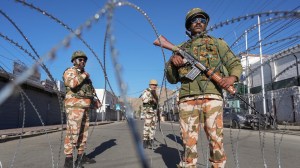End of an era
Ronald Wilson Reagan, 40th president of the United States, who transformed the Republican Party and substantially defined the terms of conte...

Ronald Wilson Reagan, 40th president of the United States, who transformed the Republican Party and substantially defined the terms of contemporary political debate during two momentous terms in office, died on Saturday afternoon. He was 93.
Ten years after the ‘‘Great Communicator’’ announced his Alzheimer’s disease in an open letter to the American people, Reagan’s long twilight reached its end at his home in Bel Air, California, in the company of his wife and their children. ‘‘My family and I would like the world to know that Ronald Reagan has passed away,’’ former first lady Nancy Reagan said in a written statement. ‘‘We appreciate everyone’s prayers.’’
President Bush got the news in Paris when he had just left a dinner with French President Jacques Chirac. In Washington and California, plans were quickly implemented for the capital’s first presidential funeral in more than 30 years. The last was that of Lyndon Johnson in 1973. Initial plans call for Reagan’s remains to lie for a day at his presidential library in Simi Valley, then travel by Air Force One to Washington, where he will lie in state in the Capitol rotunda.
At mid-week, probably on Wednesday, there will be a funeral procession with horse-drawn caisson from the Capitol to a spot near the White House. From there, a hearse will carry the casket to Washington National Cathedral for a funeral officiated by the newly named ambassador to the United Nations, John C. Danforth, an Episcopalian minister and a former Republican senator from Missouri.
The body will then be flown back to California to be buried at the Ronald Reagan Presidential Library and Museum. ‘‘This is a sad hour in the life of America,’’ Bush said after speaking with Nancy Reagan by telephone. ‘‘A great American life has come to an end.’’
It was an almost unbelievable life, a melodrama, a rags-to-riches tale, a multi-part saga written by someone with boundless imagination and an infinite sense of the possible.
Born in tiny Tampico, Illinois, educated at Eureka College in nearby Dixon, Reagan was a radio sportscaster, a Hollywood B-movie star, host of a TV variety show, a soap salesman, a motivational speaker, governor of California, and — starting at age 53 — arguably the most important American political figure since Franklin D. Roosevelt.
So it was no wonder that he believed all things were possible, from the collapse of the Soviet Union, which he predicted even when the clash of superpowers seemed near its most menacing point, to the complete disarmament of all nuclear arsenals, which Reagan proposed in a stunning arms-control summit near the end of his administration.
What seemed to some as naivete struck others as good old gumption. Reagan was a champion salesman of the American dream, mayor-for-life of the land he called ‘‘a shining city on a hill’’. Sen. John F. Kerry (Mass.), presumptive Democratic presidential nominee, said, ‘‘Ronald Reagan’s love of country was infectious,’’ and he praised the late president for his goodwill in the heat of partisan battle. ‘‘Even when he was breaking Democrats’ hearts, he did so with a smile and in the spirit of honest and open debate. Despite the disagreements, he lived by that noble ideal that at 5 pm we weren’t Democrats or Republicans, we were Americans and friends.’’
Like all forceful leaders, Reagan made some people very angry but his gift for communication and his bedrock optimism attracted far more supporters than critics.
In 1984, he was re-elected with the largest number of popular and electoral votes in US history. Though the nation has added some 50 million people since then, no candidate has surpassed his record. His electoral vote landslide that year was among the most lopsided in history.
He entered the White House older than any previous occupant yet as the candidate of fresh ideas, from supply-side economics to welfare reform. He intrigued political pundits.
He left the public eye in 1994, soon after attending the funeral of Richard M. Nixon, the previous president to pass away.
—LAT-WP







- 01
- 02
- 03
- 04
- 05
























